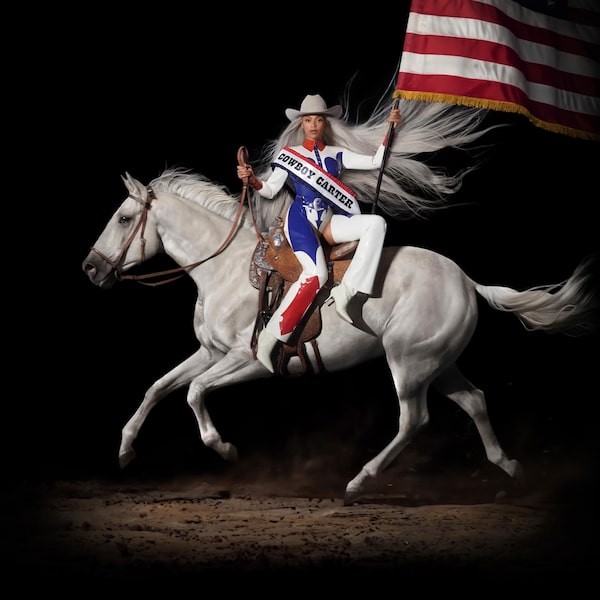
On the album cover, Beyoncé is pictured wearing red, white and blue while riding a horse in the most ridiculous way. Don’t let the saddle shenanigans fool you – this is not Queen Bey’s first rodeo.The Associated Press
Beyoncé opens her country-fried Cowboy Carter album with Ameriican Requiem, a cinematic curtain-raiser from a Houston-born superstar who can spell “American” any way she chooses. The song’s musical inspirations seem to range from gospel to Prince to the strummed hippie psychedelia of Buffalo Springfield’s For What it’s Worth. Lyrically, it is a backstory for the album’s reason for being.
They used to say I spoke too country
Then the rejection came, said I wasn’t country ‘nough
Said I wouldn’t saddle up, but
If that ain’t country, tell me, what is …
Released Friday, the multigenre 27-track tour de force is the singer’s sure-footed statement on who she is and what constitutes country music. The historic sounds of Louisiana and Texas in particular are explored; the rights of Black Americans to yee-haw melodiously are affirmed.
Willie Nelson shows up – twice. Oh Louisiana is zydeco-encoded, and Dolly Parton’s Jolene is covered. With the previously released single Texas Hold ‘Em – a plucky two-stepper featuring Rhiannon Giddens on banjo and viola – Beyoncé became the first Black woman to top the Billboard’s Hot Country Songs chart.
The whole thing is an Oxford American Southern Music issue come to life. (If you know, you know.)
On the album cover, Beyoncé is pictured wearing red, white and blue while riding a horse in the most ridiculous way. Don’t let the saddle shenanigans fool you – this is not Queen Bey’s first rodeo.
She included the country-flavoured Daddy Lessons on her blockbuster album Lemonade in 2016. Less than a week before Donald Trump won the U.S. presidential election that year, Beyoncé performed the song with the Chicks at the Country Music Awards. The appearance resulted in racist backlash. As well, the Recording Academy denied its inclusion in the Grammys’ country categories.
The rejection apparently fuelled the making of Cowboy Carter.
“This album has been over five years in the making,” she shared on an Instagram statement earlier this month that explained her motivations for going country. “It was born out of an experience that I had years ago where I did not feel welcomed … and it was very clear that I wasn’t. But, because of that experience, I did a deeper dive into the history of country music and studied our rich musical archive.”
The results are entertaining, not bitter. On the fiery cover version of Parton’s 1973 hit, Beyoncé tweaks the lyrics to personalize the story: “I’m still a Creole banjee … don’t try me.”
Okay, maybe a little bitter.
The version of Paul McCartney’s Beatles song Blackbird – inspired by racial tension in the southern United States in the 1960s – is faithful to the original.
Bodyguard is a breezy pop number built for convertibles and Top 40. If Beyoncé wagered she could make the word “Kevlar” hummable, she’s won the bet. The silence you hear when the track is done is the Song of the Summer discussion shutting down completely – no other nominations needed.
Collaborations are well chosen; famous music bits are sampled. The go-go dancing Ya Ya is straight out of the groovy 1960s, even without interpolation of the Beach Boys’ Good Vibrations. Note to Beyoncé: Nancy Sinatra wants her boots back.
The duets with Post Malone and Miley Cyrus will get attention, but the contributions of country legends are conceptually more interesting. The 90-year-old Nelson is onboard as a dope-toking DJ on station KNTRY. What sounds like a scratchy radio plays snippets of yodelling, gospel, Chuck Berry’s Maybellene and Don’t Let Go by Roy Hamilton, an early influence on Elvis Presley.
Call it Black music or call it country music or call it Americana. Or maybe don’t bother calling it anything at all.
“Genres are a funny little concept, aren’t they?” explains Black country music pioneer Linda Martell on her spoken word contribution to the rap track Spaghettii. (Again with the double ii, a reference to the album being the second installment of her trilogy that began with 2022′s Renaissance.) “In theory, they have a simple little definition that’s easy to understand. But in practice, well, some may feel confined.”
Some, but not Beyoncé. “This ain’t a country album,” she said on her Instagram post. “This is a Beyoncé album.” She ends Cowboy Carter with the churchy Amen: “Can you hear me now?”
Loud and clear.
 Brad Wheeler
Brad Wheeler